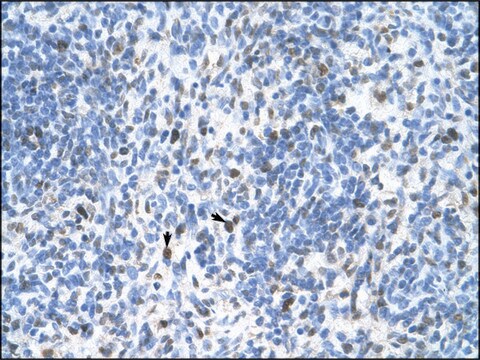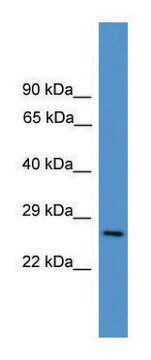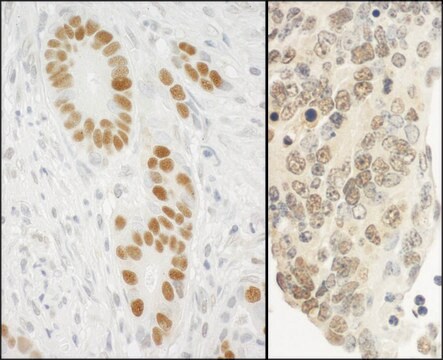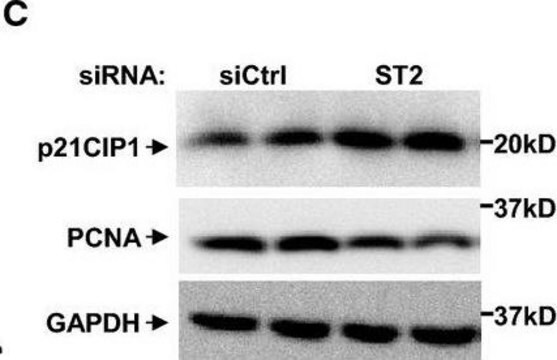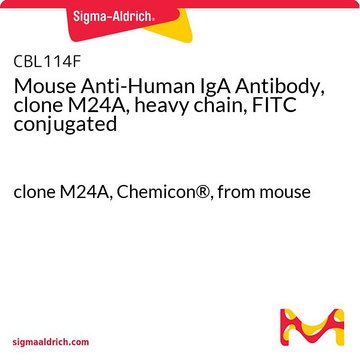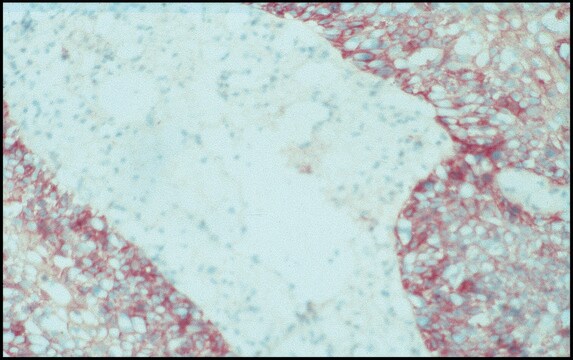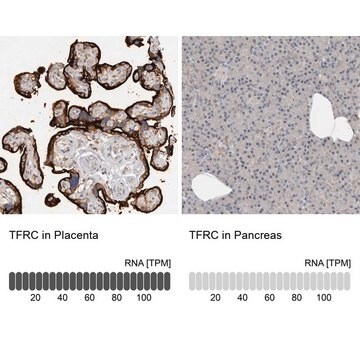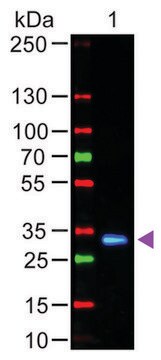推荐产品
生物源
mouse
品質等級
抗體表格
purified from hybridoma cell culture
抗體產品種類
primary antibodies
無性繁殖
PC 10, monoclonal
形狀
buffered aqueous solution
分子量
antigen ~36 kDa
物種活性
monkey, rat, insect, mouse, yeast, human
濃度
~1.0 mg/mL
技術
ELISA: suitable
flow cytometry: suitable
immunoblotting: 0.5-1 μg/mL using human foreskin fibroblast HS-68 cell line extract
immunofluorescence: 1.25-2.5 μg/mL using HeLa cells
immunohistochemistry: 10 μg/mL using heat-retrieved formalin-fixed, paraffin-embedded human Tonsil sections.
immunoprecipitation (IP): suitable
同型
IgG2a
UniProt登錄號
運輸包裝
dry ice
儲存溫度
−20°C
目標翻譯後修改
unmodified
基因資訊
human ... PCNA(5111)
一般說明
Anti-Proliferating Cell Nuclear Antigen antibody (mouse IgG2a isotype) is derived from the PC 10 hybridoma produced by the fusion of mouse myeloma cells and splenocytes from a BALB/c mouse. PCNA is an auxiliary protein of DNA polymerase δ and belongs to the conserved sliding clamp family of proteins.
PCNA (proliferating cell nuclear antigen) gene is mapped in human chromosome 20p12.3. PCNA is a homotrimeric protein, which is expressed in the nucleus. The PCNA ring has a large central cavity that allows double-stranded DNA to slide freely along it.
特異性
Monoclonal Anti-Proliferating Cell Nuclear Antigen (PCNA) specifically recognizes Proliferating Cell Nuclear Antigen from human, monkey, rat, mouse, insect and yeast origin.
免疫原
PCNA-Protein A fusion protein.
應用
Anti-Proliferating Cell Nuclear Antigen antibody, Mouse monoclonal may be used in:
- enzyme-linked immunosorbent assay (ELISA)
- immunoblotting
- flow cytometry
- immunohistochemistry
- immunoprecipitation
- immunofluorescence
生化/生理作用
PCNA (proliferating cell nuclear antigen) maintains the polymerase and DNA association by forming a sliding clamp and ensures efficient DNA replication. PCNA is responsible for recruiting important regulatory factors for DNA damage tolerance mechanism. In response to UV irradiation-induced DNA damage, monoubiquitination of PCNA mediates the polymerase switching model by recruiting DNA polymerase η to PCNA. The protein is involved in base excision repair and maintains genome stability. PCNA is associated with proteolysis coupled to DNA synthesis and repair for proper cell cycle progression.
PCNA protein is essential for chromosomal DNA replication during S-phase and is required for several DNA processes like DNA repair, sister chromatid cohesion and cell cycle control. This protein is also involved in the epigenetic modification and chromatin assembly and remodeling. PCNA acts as a prognostic and diagnostic marker in several diseases such as breast cancer, chronic lymphoid leukemia, non-Hodgkin′s lymphoma, malignant and nonmalignant skin diseases and systemic lupus erythematosus.
外觀
Solution in 0.01 M phosphate buffered saline, pH 7.4, containing 15 mM sodium azide.
儲存和穩定性
For continuous use, store at 2-8°C for up to one month. For extended storage, freeze in working aliquots. Repeated freezing and thawing is not recommended. If slight turbidity occurs upon prolonged storage, clarify the solution by centrifugation before use. Working dilution samples should be discarded if not used within 12 hours.
免責聲明
Unless otherwise stated in our catalog or other company documentation accompanying the product(s), our products are intended for research use only and are not to be used for any other purpose, which includes but is not limited to, unauthorized commercial uses, in vitro diagnostic uses, ex vivo or in vivo therapeutic uses or any type of consumption or application to humans or animals.
未找到合适的产品?
试试我们的产品选型工具.
儲存類別代碼
10 - Combustible liquids
閃點(°F)
Not applicable
閃點(°C)
Not applicable
Karin M Gilljam et al.
The Journal of cell biology, 186(5), 645-654 (2009-09-09)
Numerous proteins, many essential for the DNA replication machinery, interact with proliferating cell nuclear antigen (PCNA) through the PCNA-interacting peptide (PIP) sequence called the PIP box. We have previously shown that the oxidative demethylase human AlkB homologue 2 (hABH2) colocalizes
Proliferating cell nuclear antigen prevents trinucleotide repeat expansions by promoting repeat deletion and hairpin removal.
Beaver JM
DNA Repair (2016)
E J Nouwen et al.
Laboratory investigation; a journal of technical methods and pathology, 70(4), 479-493 (1994-04-01)
Little is known about the impact of acute proximal tubular injury and dysfunction on the distal nephron. Selective necrosis of the kidney proximal convoluted tubule (PCT) was induced in rats by subcutaneous injection of the aminoglycoside gentamicin during 2 days.
Shao-Chun Wang
Trends in pharmacological sciences, 35(4), 178-186 (2014-03-25)
Proliferating cell nuclear antigen (PCNA) is known as a molecular marker for proliferation given its role in replication. Three identical molecules of PCNA form a molecular sliding clamp around the DNA double helix. This provides an essential platform on which
H K Wolf et al.
The journal of histochemistry and cytochemistry : official journal of the Histochemistry Society, 40(9), 1269-1273 (1992-09-01)
We describe the effects of tissue preservation, fixation time, and hydrolytic treatment on the detection of proliferating cell nuclear antigen (PCNA) by immunoperoxidase staining with three commercial anti-PCNA antibodies (19A2, 19F4, PC10). Our goal was to provide guidelines for PCNA
我们的科学家团队拥有各种研究领域经验,包括生命科学、材料科学、化学合成、色谱、分析及许多其他领域.
联系技术服务部门